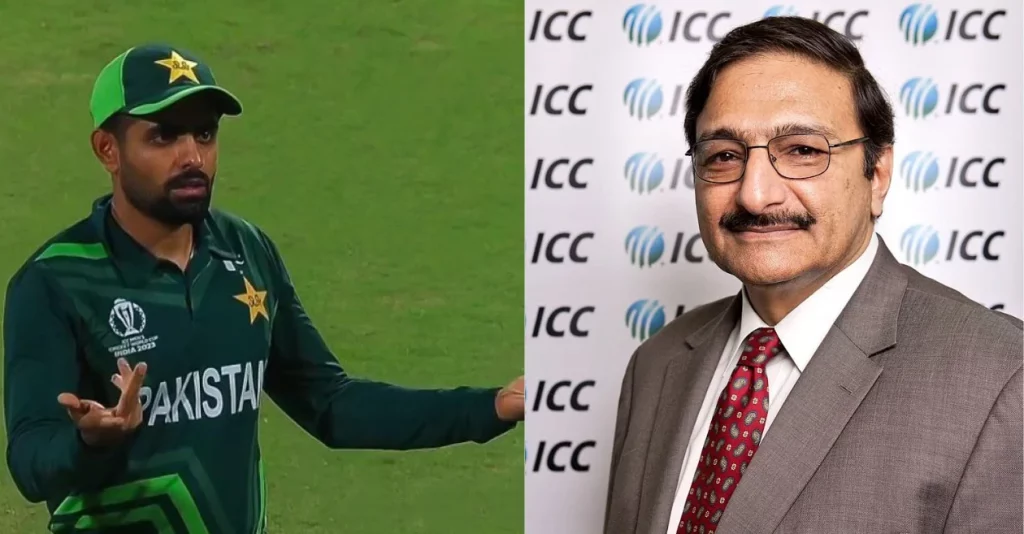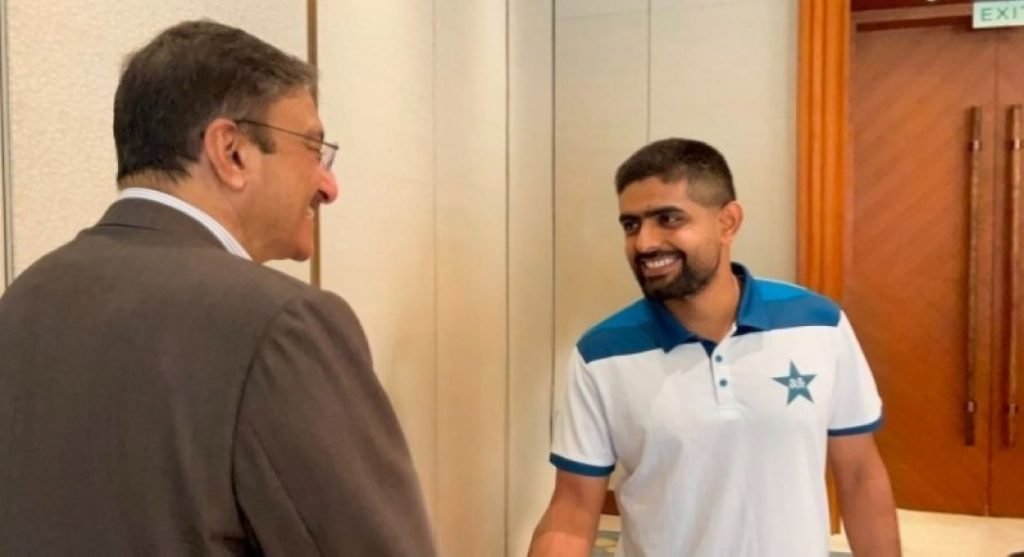Babar Azam Whatsapp Leaked Chat: In the world of cricket, where every delivery and boundary can be a game-changer, the recent Babar Azam WhatsApp controversy has not only stirred the cricketing community but also ignited a conversation about privacy and media responsibility. Let’s delve into this unfolding saga, which raises important questions about ethics, consent, and the consequences of our actions.

The Leaked Chat and Ethical Concerns:
The controversy began when former Pakistan captain Rashid Latif claimed that Babar Azam’s attempts to communicate with senior members of the Pakistan Cricket Board (PCB) were going unanswered. These allegations gained traction, and social media was abuzz with rumors and discussions.

To add fuel to the fire, a private news channel aired what appeared to be a screenshot of an alleged WhatsApp chat between Babar Azam and a senior PCB official. The chat revolved around Babar Azam’s attempts to contact the PCB Chairman and the alleged lack of response.
However, the real ethical concern emerged when netizens and former cricketers expressed their anger and disappointment over the channel’s decision to air what was deemed a private conversation. The leaked chat raised questions about the boundaries of privacy in the digital age.
Babar Azam Whatsapp Leaked Chat:
Anchor Salman: Babar, there’s also been this news circulating on TV and social Media that you have been calling chairman and he’s not answering. Have you called him recently?
Babar Azam:Salam salman bhai maine to sir ko koi call nahi ki.
Translate English “No Salman brother I didn’t call to sir”.
Anchor Salman: OK thanks.
Azhar Ali’s Question: Consent and Responsibility:
During the discussion on the show, former Pakistan cricketer Azhar Ali raised a pivotal question: did the reporter take Babar’s consent before leaking this private communication? The response he received was that, as a reporter, he didn’t need to ask for consent. This moment highlighted the need for a deeper conversation about media responsibility and the privacy of individuals, even in the public eye.
Waseem Badami’s Apology:
The anchor of the show, Waseem Badami, later issued an apology on behalf of his team and the TV management for the controversial move. He explained that, despite initial consultations against airing the chat, they had come across a video clip of the PCB chief reportedly allowing the chat to be aired and taking full responsibility for it. This led to the decision to broadcast the screenshot minutes before the show.

Badami acknowledged that the decision was taken in haste and that they were not aware of whether Babar Azam had consented to its live airing. He expressed regret and stated that, had they known it was a private conversation, they wouldn’t have aired it without consent.
The Gray Area of Permission:
It is important to note that the PCB chief’s purported permission was not entirely relevant to the matter at hand since the conversation involved two private individuals, and neither of them was Zaka Ashraf. The controversy underscores the need for a clear line between what’s private and what’s permissible for public consumption.
A Lesson for All:

The Babar Azam WhatsApp controversy serves as a valuable lesson for both media professionals and individuals in the digital age. It emphasizes the importance of respecting an individual’s right to privacy and the need for consent when private conversations are made public.
Media Responsibility and Accountability:
Media outlets have a significant role in shaping public opinion. This incident highlights the responsibility that media organizations and reporters bear when handling sensitive information. Media professionals should exercise care and ethical judgment in their decisions, recognizing the potential consequences of their actions.
Privacy in the Digital Age:
In an era where digital communication is integral to our lives, it’s essential to maintain a boundary between personal and public information. The Babar Azam saga reminds us that, regardless of an individual’s public status, privacy remains a fundamental right.
Conclusion:
The Babar Azam WhatsApp controversy isn’t just about cricket; it’s a reflection of the broader challenges we face in the digital age. Privacy, consent, and media responsibility are topics that extend beyond the boundaries of the cricket field.
As the controversy continues to unfold, the focus should remain on the game, Babar Azam’s performance as a cricketer, and the collective passion of cricket fans. This incident serves as a reminder to all of us that, in a world where information can be shared with a single click, we must uphold the ethical principles that guide our actions.
The Babar Azam WhatsApp controversy is a catalyst for a broader conversation about privacy, consent, and media ethics. It’s an opportunity for us all to reflect on the values that should shape our actions, both in cricket and in our interactions in the digital landscape. The consequences of our actions, as demonstrated in this incident, are far-reaching, and they underscore the need for a more ethical, respectful, and responsible approach to communication in the digital age.

2 Comments